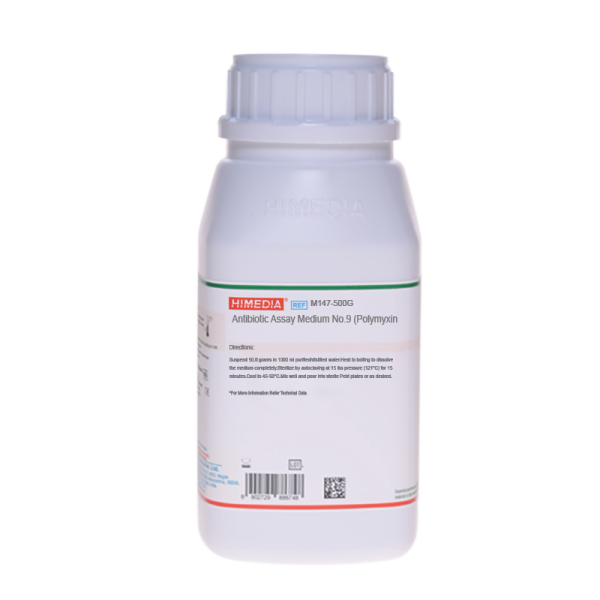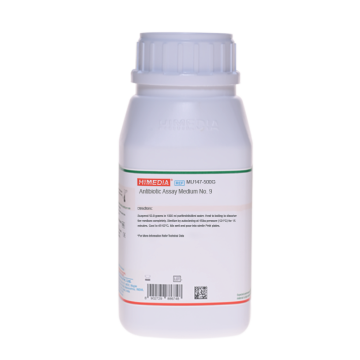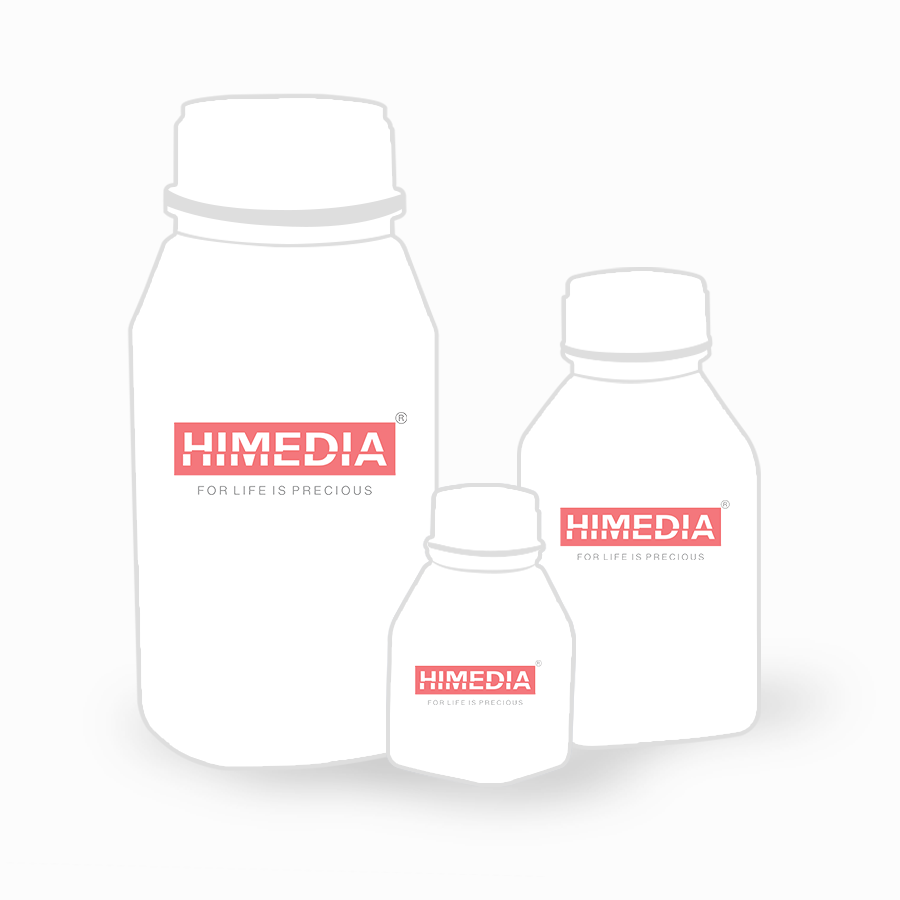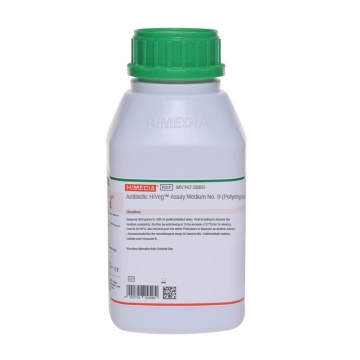 Your enquiry has been submitted
Your enquiry has been submitted
Antibiotic Assay Medium No. 9 (Polymyxin Base Agar)
Intended Use
Recommended as a base layer medium for assaying the products containing Polymyxin-B.
Composition**
| Ingredients | Gms / Litre |
|---|---|
| Tryptone | 17.000 |
| Soya peptone | 3.000 |
| Sodium chloride | 5.000 |
| Dipotassium hydrogen phosphate | 2.500 |
| Dextrose (Glucose) | 2.500 |
| Agar | 20.000 |
Final pH ( at 25°C): 7.2±0.2
**Formula adjusted, standardized to suit performance parameters
Directions
Suspend 50 grams in 1000 ml purified / distilled water. Heat to boiling to dissolve the medium completely. Sterilize by autoclaving at 15 lbs pressure (121°C) for 15 minutes. Cool to 45-50°C. Mix well and pour into sterile Petri plates or as desired.
Principle And Interpretation
This medium is widely recommended for assay of Polymyxin B, Colistimethate sodium and Colistin using Bordetella bronchiseptica as test organisms. Carbenicillin assay is also performed using this medium with Pseudomonas aeruginosa. The medium is numerically identical with the name assigned by Groove and Randall (1).
Tryptone and Soya peptone serves as source for essential nutrients. Dextrose stimulates the growth by providing carbon and energy. Phosphates in the medium enhances buffering action and sodium chloride maintains osmotic equilibrium in the medium. Agar concentration provides control over the diffusion activity of polymixin B antibiotics and provides solid substratum to support the seed agar layer.
To perform the antibiotic assay the Base Agar should be prepared on the same day as the test. For the cylinder method, a base layer of 21 ml is required. Once the base medium has solidified, seed layer inoculated with the standardized culture can be overlaid. Even distribution of the layer is important.
Type of specimen
Pharmaceutical preparations
Specimen Collection and Handling
For pharmaceutical samples follow appropriate techniques for handling specimens as per established guidelines (2,3). After use, contaminated materials must be sterilized by autoclaving before discarding.
Warning and Precautions
Read the label before opening the container. Wear protective gloves/protective clothing/eye protection/ face protection. Follow good microbiological lab practices while handling specimens and culture. Standard precautions as per established guidelines should be followed while handling specimens. Safety guidelines may be referred in individual safety data sheets.
Limitations
- Freshly prepared plates must be used or it may result in erroneous results.
Performance and Evaluation
Performance of the medium is expected when used as per the direction on the label within the expiry period when stored at recommended temperature.
Quality Control
Appearance: Cream to yellow homogeneous free flowing powder
Gelling: Firm, comparable with 2.0% agar gel.
Colour and Clarity of prepared medium: Light amber coloured clear to slightly opalescent gel forms in Petri plates
Reaction: Reaction of 5% w/v aqueous solution at 25°C. pH : 7.2±0.2
pH: 7.00-7.40
Cultural Response
Cultural characteristics observed after an incubation at 35-37°C for 18-24 hours.
| Organism | Inoculum (CFU) | Growth | Recovery | Antibiotics assayed |
|---|---|---|---|---|
| Bordetella bronchiseptica ATCC 4617 | 50-100 | good | 50-70% | Colistimethate sodium, Colistin, Polymyxin B |
| Pseudomonas aeruginosa ATCC 25619 | 50-100 | luxuriant | >=70% | Carbenicillin |
| Pseudomonas aeruginosa ATCC 27853 (00025*) | 50-100 | luxuriant | >=70% | Carbenicillin |
Key : (*) Corresponding WDCM numbers.
Storage and Shelf Life
Store between 10-30°C in a tightly closed container and use freshly prepared medium. Use before expiry date on the label. On opening, product should be properly stored dry, after tightly capping the bottle in order to prevent lump formation due to the hygroscopic nature of the product. Improper storage of the product may lead to lump formation. Store in dry ventilated area protected from extremes of temperature and sources of ignition Seal the container tightly after use. Product performance is best if used within stated expiry period.
Disposal
User must ensure safe disposal by autoclaving and/or incineration of used or unusable preparations of this product. Follow established laboratory procedures in disposing of infectious materials and material that comes into contact with sample must be decontaminated and disposed of in accordance with current laboratory techniques (2,3).
Reference
- Grove and Randall, 1955, Assay Methods of Antibiotics Medical Encyclopedia, Inc. New York.
- Isenberg, H.D. Clinical Microbiology Procedures Handbook 2nd Edition.
- Jorgensen, J.H., Pfaller, M.A., Carroll, K.C., Funke, G., Landry, M.L., Richter, S.S and Warnock., D.W. (2015) Manual of Clinical Microbiology, 11th Edition. Vol. 1.
| Product Name | Antibiotic Assay Medium No. 9 (Polymyxin Base Agar) |
|---|---|
| SKU | M147 |
| Product Type | Regular |
| Physical Form | Powder |
| Origin | Animal |
| Packaging type | HDPE |
| References | 1. Grove and Randall, 1955, Assay Methods of Antibiotics Medical Encyclopedia, Inc. New York |
| Customized Product Available | No |







